Mate 30 is the best 30: flat screen, giant battery, excellent camera kit
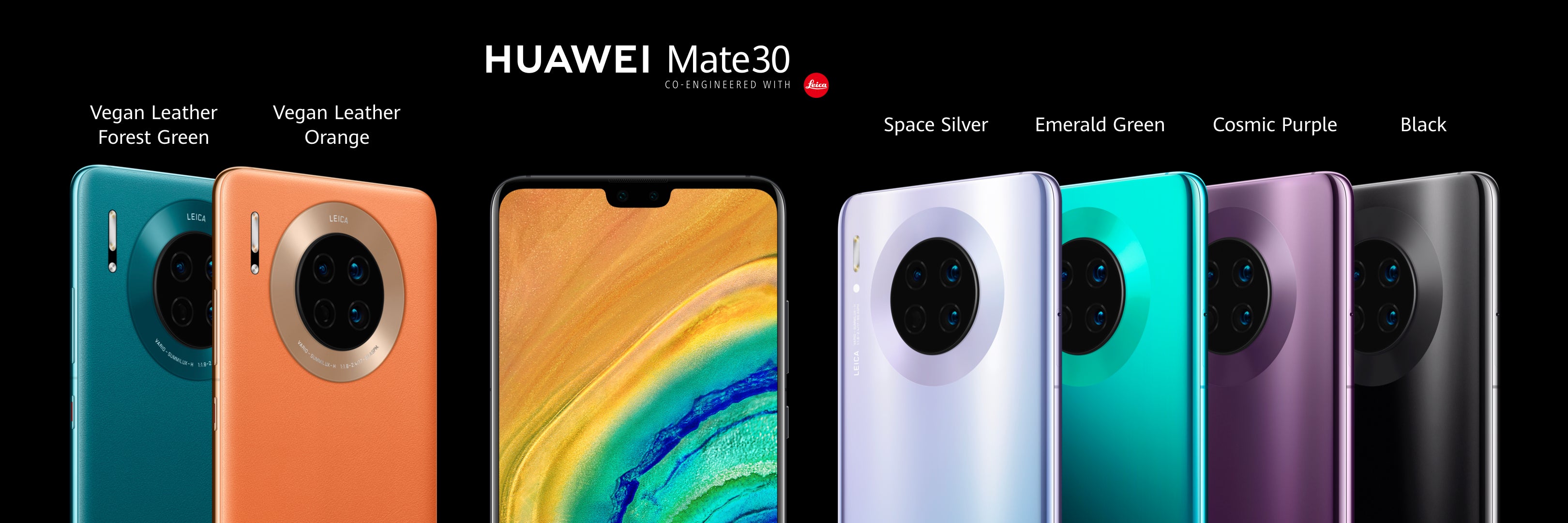
Huawei Mate 30 design and display
The phone is a proud heir of the Mate 20, with a prominent camera set in the middle of the back, not tucked in the corner like on the new iPhones.
Offered in the two vegan leather and four matte-to-gloss transitional glass finishes that you see above, the 30 design is unique and intriguing. Whether you choose the faux leather, or the glass ones, Huawei promises they won't be slippery, at least at the places where you usually rest your fingers.
Huawei Mate 30 sports a 6.62-inch OLED display with FHD+ resolution (2340 x 1080). It is, thankfully, not a "waterfall" one, or, as Huawei now calls it, Horizon Display, but a good ol' rigid OLED screen.

Huawei Mate 30 specs and battery life
Samsung took the laurels of announcing the first second-gen 7nm processor - Exynos 9825 - before Huawei this year, unlike what happened with Huawei's Kirin 980 last fall. Samsung was also the first to announce an integrated all-in-one 5G chipset - the Exynos 980 - which solders midrange chippery together with a 5G modem for the first time. Until now, all 5G phones came with one extra Qualcomm, Samsung or Huawei 5G modem tacked on separately that puts extra drag on the battery and RAM capacities.
The Kirin 990 that Huawei announced this month, however - the first high-end mobile applications processor combined with an efficient 5G modem in a true system-on-a-chip style - is now in phones like the Mate 30, whereas Samsung has still to tip any handsets where the Exynos 980 will be used. Both the Kirin 990 processor cores and the 5G modem chip are laid out with the most efficient process available at the moment - a second generation 7nm EUV lithography, just like the Exynos 9825.
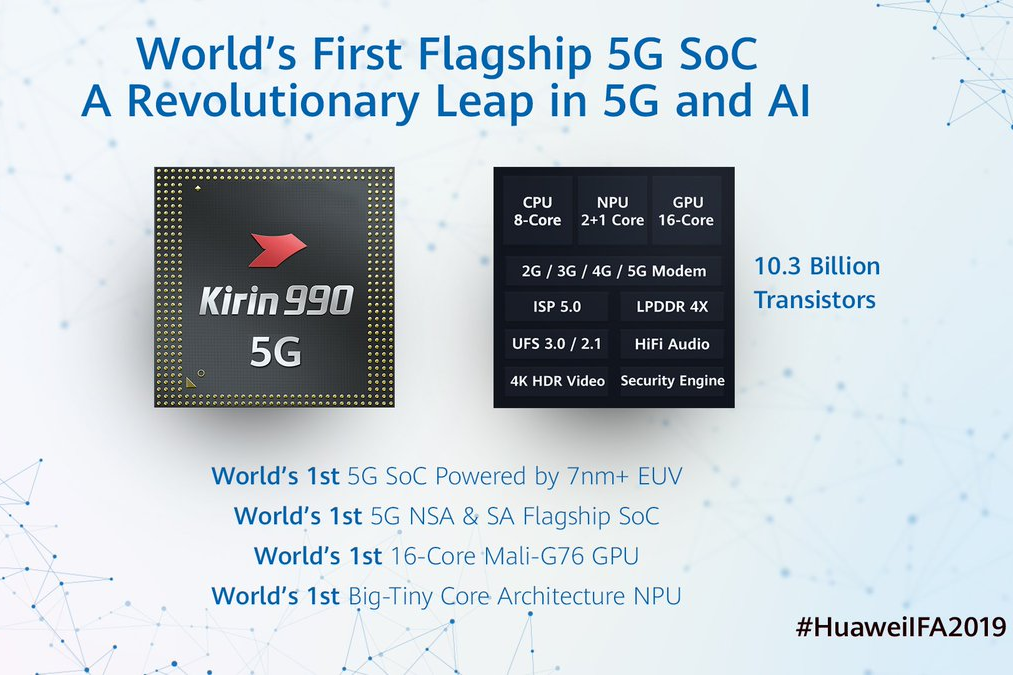
Since the special emphasis here is that this is as high-end of a chipset as Apple's A13 in the iPhone 11 would be, built on the same N7+ process by TSMC, and yet will feature an integrated 5G modem, something unheard of so far, we want to focus precisely on the 5G abilities.
Sadly, these don't include the high-frequency mmWave bands that Verizon, T-Mobile and the US carrier networks currently use for 5G in general. In 2020, however, all major US carriers will start rolling out their low-band 5G networks en masse. Needless to say, Huawei has a snowball's chance in hell to have phones on US carriers given the White House administration animosity towards its products but it's cool that we are finally getting a true 5G SoC for high-end phones.
Huawei boasted that the Mate 30 series have 14 antennas, so they should have good reception if they are sold in your region, as the most others do is six. The Mate 30 comes packaged with 8GB RAM and 128GB base storage, not a bad setup. The fast 40W wired and ultrafast 27W wireless charging are on board, and Huawei promises more than 8 hours of screen-on time with very heavy usage. Looking at the 4200 mAh battery pack, we are inclined to believe the hype.
Huawei Mate 30 camera
The most intriguing part of any Huawei flagship of late has been the camera kit. The company pioneered the generous 3-5x telephoto zoom and the night mode before it became cool with Google's Pixels. It wasn't afraid to take a gamble on a brand new and unproven "yellow pixels" sensor technology that proved quite capable in this year's P30 series.
The Mate 30 isn't ploughing ahead with record zoom levels or new sensor shenanigans, yet it does introduce a wildly capable photography kit with some new features taken from its Pro sibling, and made possible by the new Kirin 990 chipset.
There is a triple rear camera on the back, consisting of a 16MP ultra wide-angle (with f/2.2 aperture), 40MP SuperSensing (f/1.8 aperture), and 8MP telephoto camera (f/2.4 aperture), plus a laser focus sensor to round the circle. For selfies, Huawei offers a capable 24MP shooter with f/2.0 aperture.
The main camera keeps the RYYB pixel arrangement with the "revolutionary" yellow ones from the P30 series that aid low-light photography. Huawei offers 3x optical zoom and plenty more of the hybrid variety. and the huge 40MP sensor promises crazy good night shots. This time around, Huawei paid attention to the video recording abilities, too, and there are plenty of modes and 4K 60fps to choose from.
Huawei Mate 30 price and release date
Starting at EUR 799, the Mate 30 sits in the golden middle, given that its Pro version is EUR 1099, and will be available for purchase next month in two vegan leather and four matte-to-gloss transitional glass finishes. These are Space Silver, Cosmic Purple, Black, and Emerald Green for the glass options, while the Vegan Leather versions come in flashy Orange or Forest Green.
Whether or not the Mate 20 will find willing buyers in places like Europe, depends on how the trade deal with China progresses, and, concurrently, the relationship with Google regarding its Android apps.
Follow us on Google News






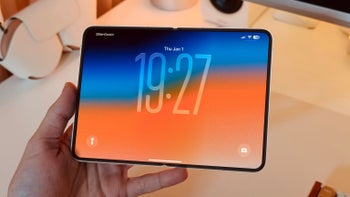

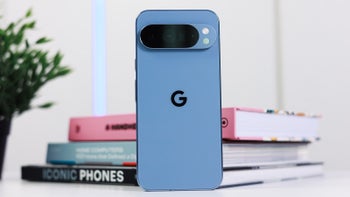
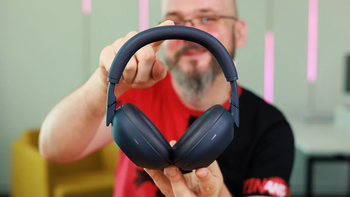
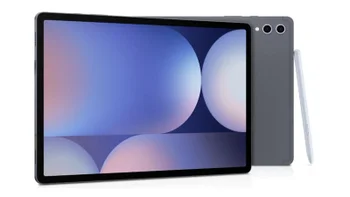
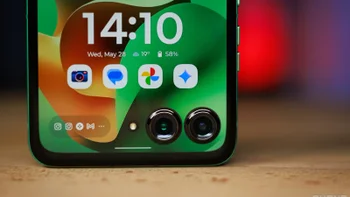
Things that are NOT allowed:
To help keep our community safe and free from spam, we apply temporary limits to newly created accounts: